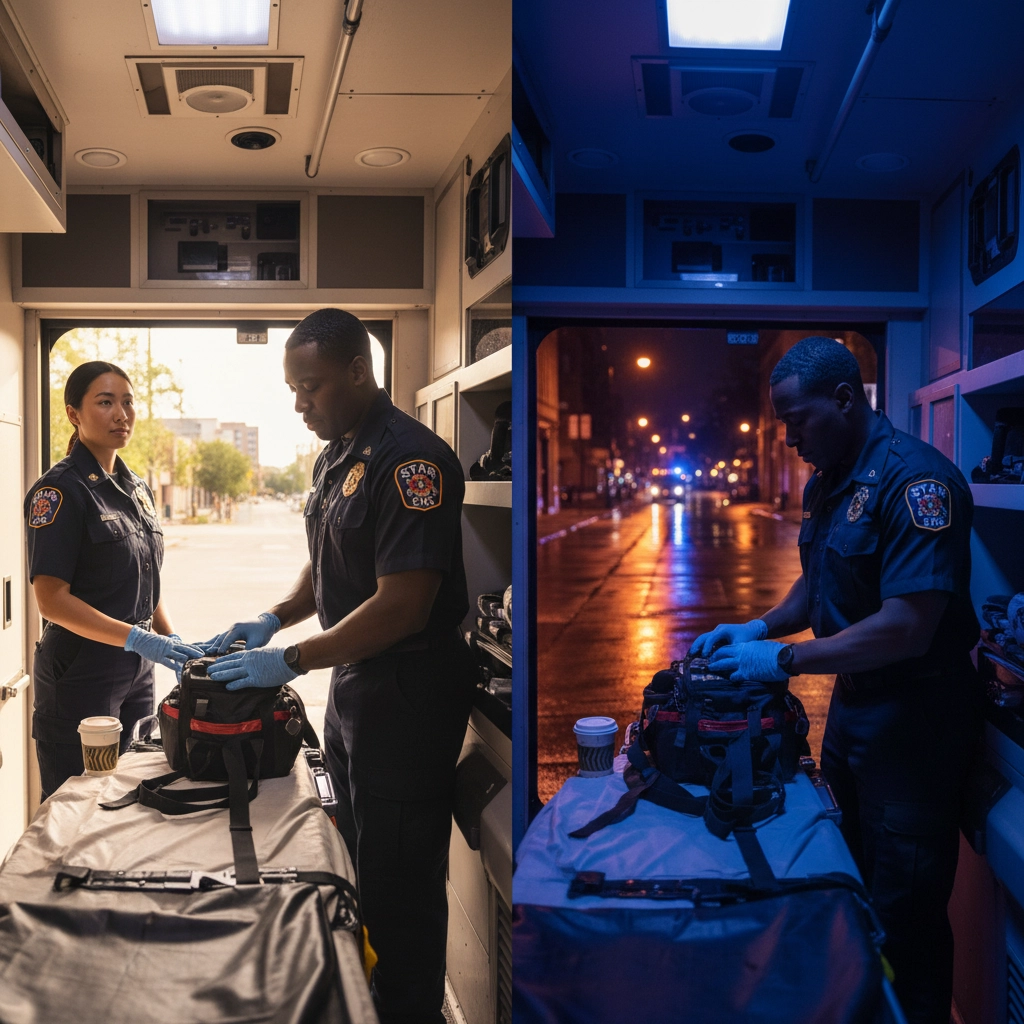Struggling with EMS Burnout? 10 Signs Your Team Needs Trauma-Informed Support

If you're managing an EMS team, you've probably noticed something's off lately. Maybe it's the way your usually upbeat paramedic barely makes eye contact during briefings. Or how your most experienced EMT has been calling in sick more often.
Here's the thing – you're not imagining it. EMS burnout has reached crisis levels, with 62% of paramedics reporting burnout during their careers and 34% receiving formal PTSD diagnoses. But here's what most people don't realize: burnout doesn't just happen overnight. It leaves breadcrumbs.

As someone who's spent years working with trauma-exposed teams, I've learned to spot these warning signs early. And trust me, catching them before they become full-blown crises can save careers, relationships, and quite literally, lives.
Let's dive into the 10 signs your EMS team needs trauma-informed support right now.
Sign #1: The Exhaustion That Sleep Can't Fix
We're not talking about being tired after a 24-hour shift. This is different. Your team members look drained even after days off. They're experiencing chronic fatigue that seems to live in their bones, no matter how much rest they get.
This isn't laziness – it's emotional exhaustion manifesting physically. When your nervous system has been in fight-or-flight mode for months (or years), it starts shutting down non-essential functions to conserve energy.
Sign #2: Sleep Has Become the Enemy
Speaking of rest, notice if your team is struggling with sleep patterns. Some can't fall asleep, lying awake replaying difficult calls. Others sleep excessively, using it as an escape from reality. Nightmares and flashbacks during sleep are red flags that trauma is literally invading their safe spaces.
When sleep stops being restorative, everything else starts falling apart.
Sign #3: The Body Keeps Score
Your team members are getting sick more often. Headaches, backaches, joint pain – their immune systems are compromised from chronic stress. Some might be experiencing significant changes in appetite or weight.
The body doesn't lie. When it's under constant stress from trauma exposure, it starts breaking down in very real, physical ways.

Sign #4: Emotional Detachment Takes Over
This one's tricky because emotional detachment can look like professionalism. But there's a difference between healthy boundaries and complete emotional shutdown.
Watch for team members who:
- Refer to patients in increasingly impersonal terms
- Use excessive black humor about tragic situations
- Seem disconnected from the emotional reality of their calls
- Show little to no emotional response to situations that would typically affect them
Sign #5: Cynicism Becomes Their Default Language
When someone who used to care deeply about their work starts saying things like "nothing we do matters anyway" or "people are just going to keep making the same stupid choices," that's cynicism talking – not wisdom.
This shift from idealism to cynicism is one of the most heartbreaking aspects of burnout. It's your team's way of protecting themselves from further disappointment, but it's also a sign they need support.
Sign #6: The Anxiety About Going to Work
Notice if team members express dread about their pager going off or anxiety about starting their shift. Some might start avoiding certain types of calls or areas they used to handle without issue.
When the job that once gave them purpose now fills them with anxiety, trauma-informed intervention isn't just helpful – it's necessary.

Sign #7: Performance Starts Slipping
Difficulty concentrating, trouble making decisions, and underperforming on routine tasks are clear indicators that burnout is affecting their cognitive abilities.
This isn't about competence – it's about a overwhelmed nervous system that can no longer process information effectively. These team members aren't failing; their systems are overloaded.
Sign #8: Isolation Becomes the Norm
Team members who used to socialize are now eating lunch alone. They're skipping shift parties, not participating in friendly banter, and generally withdrawing from their colleagues.
Isolation is both a symptom of burnout and a factor that makes it worse. When people start pulling away from their support systems, it's time to step in.
Sign #9: Avoidance Behaviors Take Hold
This shows up in different ways:
- Procrastinating on paperwork they used to complete promptly
- Avoiding certain types of calls when possible
- Calling in sick more frequently
- Showing up late or leaving early when they can
Avoidance is a trauma response. When work becomes associated with stress and trauma, the brain starts looking for ways to avoid those triggers.
Sign #10: Loss of Purpose and Meaning
Perhaps the most devastating sign is when team members start questioning whether their work makes any difference. They've lost their sense of personal accomplishment and feel like they're just going through the motions.
This is especially painful for EMS professionals who originally chose this career to help people and make a difference in their communities.

What Trauma-Informed Support Actually Looks Like
Recognizing these signs is just the beginning. Trauma-informed support isn't about telling your team to "toughen up" or "leave work at work." It's about creating psychological safety, implementing proactive mental health strategies, and building resilience before crisis hits.
This means regular debriefings after difficult calls, peer support programs, access to mental health resources, and leadership that normalizes asking for help. It means understanding that these signs aren't character flaws – they're predictable responses to an incredibly challenging job.
Moving Forward Together
If you're seeing multiple signs in your team (and let's be honest, most EMS teams are showing at least a few), it's time to take action. This isn't about fixing people who are broken – it's about supporting human beings who are doing superhuman work.
The goal isn't to eliminate all stress from EMS work (that's impossible). It's to build resilient teams that can bounce back from trauma, support each other through difficult times, and maintain their sense of purpose even in the face of tragedy.
Your team didn't choose EMS work because it was easy. They chose it because they wanted to make a difference. With proper trauma-informed support, they still can – without sacrificing their mental health in the process.
Ready to learn more about building resilient, trauma-informed teams? Visit our website to explore resources designed specifically for leaders managing trauma-exposed teams.
LinkedIn Newsletter Version:
🚨 EMS Leaders: Is Your Team Showing These Burnout Warning Signs?
With 62% of paramedics experiencing burnout and 34% diagnosed with PTSD, recognizing early warning signs isn't optional anymore – it's essential leadership.
Physical Signs:
• Chronic exhaustion that sleep doesn't fix
• Frequent illness, headaches, body pain
• Sleep disturbances, nightmares, or excessive sleeping
Emotional & Behavioral Changes:
• Emotional detachment from patients and work
• Increased cynicism and "nothing matters" attitudes
• Anxiety about shifts or specific call types
• Withdrawal from team social interactions
Performance Indicators:
• Difficulty concentrating and making decisions
• Procrastination and avoidance behaviors
• Declining job performance on routine tasks
• Loss of sense of purpose and accomplishment
The Reality: These aren't character flaws – they're predictable responses to trauma exposure.
The Solution: Trauma-informed support that includes:
✓ Regular post-incident debriefings
✓ Peer support programs
✓ Psychological safety in reporting struggles
✓ Leadership that normalizes help-seeking
Your team chose EMS to make a difference. With proper support, they still can – without sacrificing their mental health.
What signs are you seeing in your team? Share your thoughts below.
Roxanne Derhodge specializes in trauma-informed leadership and building resilient teams. Connect for resources on supporting your EMS team.
#EMSLeadership #TraumaInformed #Burnout #FirstResponders #MentalHealth

